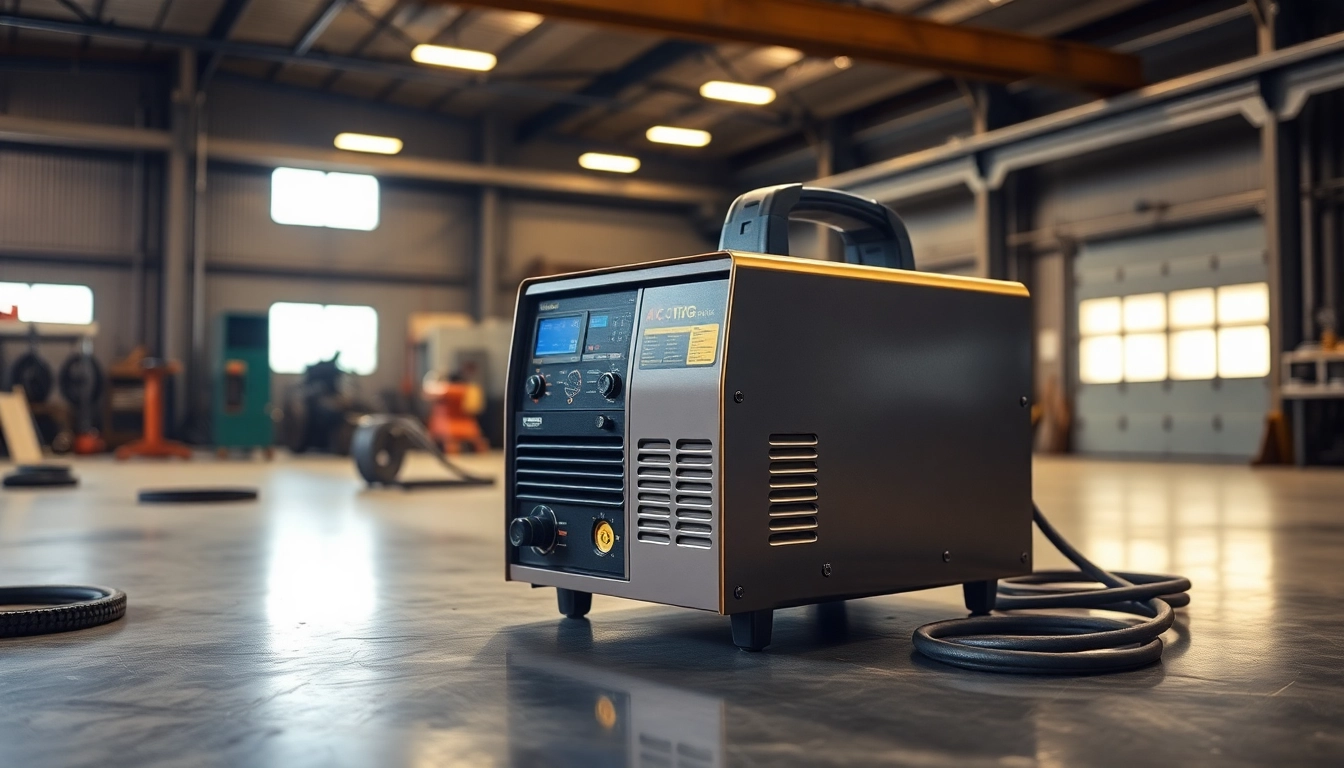Understanding AC DC TIG Welders
What is an AC DC TIG Welder?
An AC DC TIG welder is a versatile welding machine used extensively in various industries. The term “TIG” stands for Tungsten Inert Gas welding, a process that involves the use of a non-consumable tungsten electrode to produce the weld. The AC/DC designation signifies that the welder is capable of both alternating current (AC) and direct current (DC) output. This flexibility allows welders to work with a broader range of materials, including aluminum and stainless steel.
While DC is primarily used for welding ferrous metals, AC becomes indispensable when working with non-ferrous metals like aluminum. By alternating the flow of current, AC helps clean the oxide layer that forms on aluminum, ensuring a strong, high-quality weld. The addition of AC capabilities makes these welders popular in applications where precision and aesthetics are paramount.
Benefits of Using AC DC TIG Welders
The use of an ac dc tig welder offers several benefits which set them apart from other types of welding machines:
- Versatility: With the ability to weld both aluminum and steel, these welders are suited for diverse applications. This versatility allows welders to handle various projects without needing multiple machines.
- Precision: TIG welding is known for its precise control, making it ideal for intricate designs and thin materials. The operator can manipulate the arc with incredible accuracy, ensuring clean and strong welds.
- Quality Finish: The resulting weld from an AC/DC TIG welder typically exhibits a clean and aesthetically pleasing finish, which is advantageous for applications where appearance matters, such as art or decorative metalwork.
- Control of Heat Input: TIG welding allows for better control of heat input, significantly reducing the risk of warping or distorting the base materials, which is crucial, especially in thin metals.
Key Features to Look For
When selecting an AC DC TIG welder, it’s essential to consider certain features that can affect performance and usability. Here are some of the most critical features:
- Output Range: Choose a machine that can accommodate the thickness of materials you’ll primarily be working with. A wider output range allows for more versatility.
- Cooling System: A robust cooling mechanism can enhance the welder’s performance and longevity, especially during prolonged use.
- Control Features: Look for machines with advanced control features such as pulse settings and adjustable frequency, which provide additional versatility during welding.
- Foot Pedal Control: A foot pedal can provide better control over the welding process, allowing operators to adjust the temperature without interrupting their work.
- Portability: If you plan to move your welder frequently, consider its weight and whether it has built-in handles or wheels for easier transport.
How to Choose the Right AC DC TIG Welder
Assessing Your Welding Needs
The first step in selecting the right AC DC TIG welder is to evaluate your specific welding needs. Consider the following factors:
- Types of Materials: Think about the metals you will be working with. If aluminum is a key material in your projects, ensure your welder has sufficient AC capabilities.
- Welding Thickness: Different projects require different thicknesses; select a welder with a suitable amperage range for your planned work.
- Welding Position: Consider whether you’ll be working mostly on flat surfaces, vertical positions, or overhead, as this can influence your choice.
- Skill Level: Beginners may want to start with a machine that has straightforward controls, while advanced welders might benefit from more features and flexibility.
Popular Brands and Models
The market offers a variety of AC DC TIG welders from different manufacturers. Popular brands include:
- Everlast: Known for their range of options that suit both beginners and professionals, Everlast offers models like the PowerTIG series that provide excellent performance and value.
- PrimeWeld: Their TIG225X and TIG325X models are favored for their user-friendly designs and solid performance metrics.
- Miller Welding: Miller is a reputable name in welding equipment with diversified offerings, including the Syncrowave series, which is known for its durability and high-performance.
- Lincoln Electric: Featuring advanced technology and a strong brand reputation, Lincoln machines like the Aspect and Square Wave series are trusted by professionals.
Pricing and Budget Considerations
AC DC TIG welders vary significantly in price, typically ranging from $500 to over $3,000, depending on the brand, features, and specifications.
When determining your budget, consider not only the initial cost but also the long-term investment in terms of:
- Operating Costs: Higher-end machines may consume more energy but might also perform better and last longer, resulting in cost savings over time.
- Maintenance: More robust machines might require higher initial maintenance costs but could save on repairs in the future.
- Accessories: Don’t forget to account for costs associated with essential accessories, such as tanks, regulators, and personal protective equipment.
Applications of AC DC TIG Welding
Industries Utilizing AC DC TIG Welders
AC DC TIG welders are utilized across a broad spectrum of industries due to their precision and capability in handling various materials. Key industries include:
- Aerospace: The high precision required in aerospace applications makes TIG welding an ideal choice, allowing for strong and lightweight joints.
- Automotive: Creating clean welds on aluminum and stainless steel components is vital in automotive manufacturing and repair.
- Manufacturing: In various manufacturing sectors, TIG is used for both fabrication and repair, combining strength with aesthetic appeal.
- Art and Sculpture: Artists and craftsmen often prefer TIG for metal art due to the fine control it affords over the welding process.
Common Materials to Weld
One of the standout features of the AC DC TIG welder is its ability to effectively join a variety of metals. Common materials welded using AC DC TIG welders include:
- Aluminum: AC output is essential for cleaning the oxide layer and achieving strong welds.
- Stainless Steel: The DC output provides a stable arc and strong welds, making it the go-to choice for stainless steel fabrication.
- Carbon Steel: DC TIG welding allows for fast and efficient steel joining without compromising strength.
- Magnesium: This lighter metal is also effectively welded with precision using TIG, suitable for aerospace and automotive components.
Techniques for Effective Welding
To maximize the performance of an AC DC TIG welder, understanding effective welding techniques is essential. Here are some tips for proficient TIG welding:
- Proper Settings: Always set your welder according to the specifications of the material type and thickness.
- Good Argon Shielding: Using pure argon gas ensures protective coverage during welding, preventing contamination of the weld.
- Correct Electrode Preparation: Properly grind the tungsten electrode to a sharp point for precise arc control.
- Stable Positioning: Maintain a consistent hand position and steady movement to create uniform bead widths.
- Practice: Like any skill, proficiency in TIG welding improves with consistent practice, especially focusing on control and technique.
Maintenance Tips for AC DC TIG Welders
Cleaning and Care Procedures
Regular maintenance of your AC DC TIG welder is crucial to its longevity and performance. Implement the following cleaning and care procedures:
- Daily Checks: Routinely check the condition of cables, nozzles, and gas hoses for any wear or damage.
- Clean the Torch: After usage, clean the torch and remove any spatter or debris to prevent contamination.
- Inspect Electrodes: Regularly assess the tungsten electrodes and replace them when they show signs of wear.
- Keep Work Area Clean: Maintain a tidy workspace free of flammable materials and metal scraps to avoid accidents.
Identifying and Troubleshooting Common Issues
Being able to troubleshoot common problems can save time and improve efficiency when using AC DC TIG welders. Typical issues may include:
- Inconsistent Arc: This can often be addressed by checking gas flow, ensuring proper settings, or replacing a worn electrode.
- Porosity: To prevent porosity in the weld, ensure adequate shielding gas coverage and clean base materials.
- Overheating: If the welder frequently overheats, checking the duty cycle and reducing the amperage may rectify this.
Extending the Lifespan of Your Welder
To prolong the life of your AC DC TIG welder, consider these additional tips:
- Regular Maintenance: Adhere to a comprehensive maintenance schedule that includes inspections, cleaning, and repairs as needed.
- Use Quality Consumables: Invest in high-quality electrodes, filler metals, and shielding gas to enhance overall welder performance.
- Store Properly: Keep your welder in a dry and temperature-controlled environment, and use covers to protect against dust and debris when not in use.
Where to Buy AC DC TIG Welders
Top Online Retailers for AC DC TIG Welders
There are numerous online retailers where you can purchase an AC DC TIG welder. Some of the most reliable sources include:
- Alphaweld: They offer a wide selection of welding equipment with expert guidance and support.
- Everlast: Known for their competitive prices and high-quality products, their website features detailed product descriptions and specifications.
- PrimeWeld: Offers a user-friendly interface and comprehensive support for their products.
- Miller Welding: Their online store provides an array of welding equipment with detailed specifications and capability lists.
Comparing Prices and Offers
When searching for the best deal on an AC DC TIG welder, compare prices across various retailers, looking for special offers or discounts. Don’t forget to factor in shipping costs, warranties, and customer service reputation, as these can significantly impact your overall value.
User Reviews and Recommendations
Before making a purchase, it’s wise to read user reviews to gauge the performance and reliability of a welder. Checking ratings and reviews on sites like Amazon or specialized welding forums can provide insights into how a specific model performs in real-world conditions. Look for comments on durability, ease of use, and customer service experiences.



